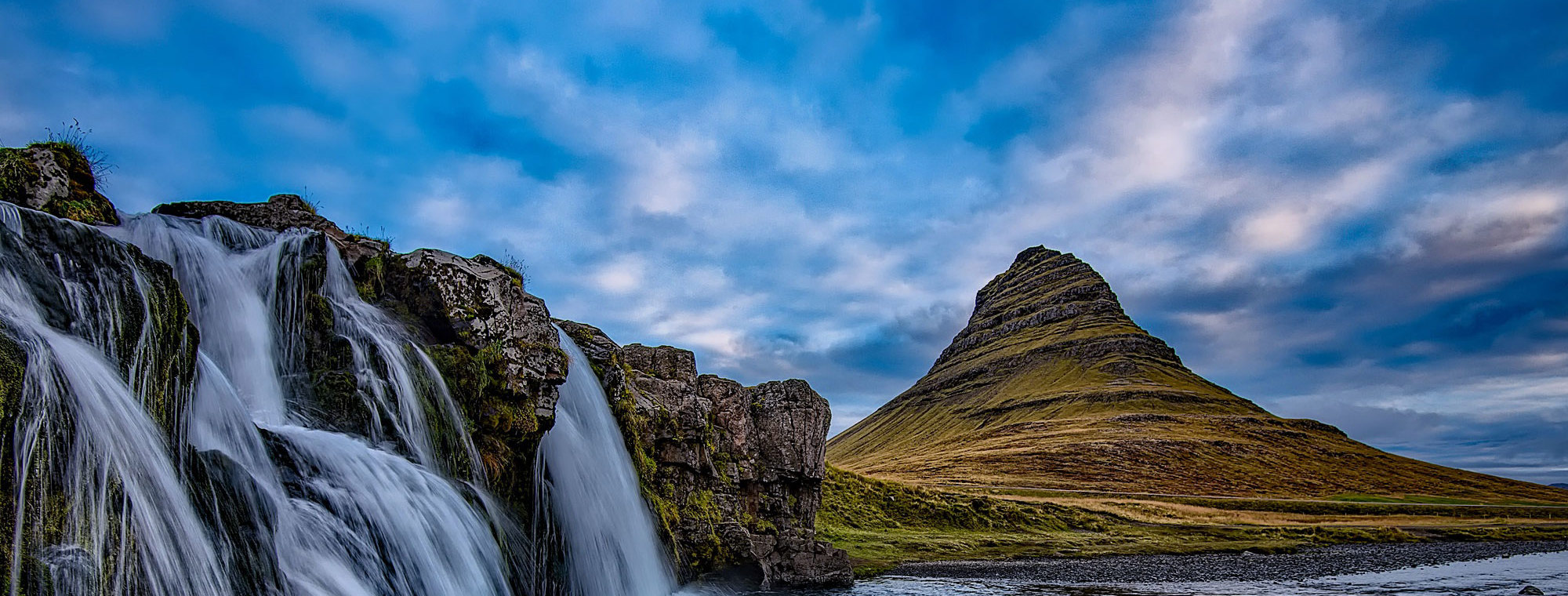Iceland Tours & Packages

Experience the land of fire and ice on one of our 6-9-day Iceland tours. From the geysers and hot springs of the Golden Circle to the stunning Northern Lights and volcanic landscapes, Iceland is a nature lover's paradise.
Iceland Tours by Region
Explore Iceland's diverse regions with a guided tour, each offering unique natural wonders and cultural experiences. From the bustling streets of Reykjavik, where modern culture and historical landmarks coexist, to the tranquil beauty of the East Fjords with their serene landscapes and rich folklore, Iceland promises an array of unforgettable experiences. The South Coast dazzles with its dramatic black sand beaches and powerful waterfalls, while the North captivates with charming towns like Akureyri, known for its vibrant art scene and stunning natural attractions. Journey to the remote Westfjords for rugged, untouched landscapes and to the Snæfellsnes Peninsula to see a microcosm of the country's diverse geology. For the adventurous, the Highlands offer surreal, otherworldly terrains and geothermal wonders. Read more on The Majestic Natural Wonders of Iceland.
The Capital Region
As Iceland’s vibrant capital, Reykjavik offers a mix of modern culture, history, and natural beauty. Here, you can explore museums, art galleries, and coffee houses, and experience the city's lively nightlife. Not to miss is the iconic Hallgrímskirkja church and splendid waterfront with its famous ‘Solfar’ or ‘Sun Voyager’ steel sculpture by Icelandic sculptor Jon Gunnar Arnason that resembles a Viking long-ship.
The South Coast
This Golden Circle route includes sites like mighty Gullfoss waterfalls (the Icelandic equivalent of Niagara Falls), the geothermal hot springs of Geysir, the majestic south coast waterfalls of Seljalandsfoss and Skógafoss, and the Strokkur geyser. Finally, known for its black sand beaches, dramatic cliffs, and puffin colonies, Vik is a must-visit on the South Coast during your Iceland vacation.
The North
Often called the "Capital of the North," Akureyri is a charming town known for its botanical gardens, vibrant art scene, and nearby natural attractions such as the Goðafoss waterfall.
Famous for its geothermal activity and birdlife, Lake Mývatn is one of Iceland's most captivating natural attractions. Located in the north of the country, this stunning lake and its surrounding area are a geological wonderland, shaped by volcanic activity over millennia. The geothermal features of the region include steaming fumaroles, hot springs, and bubbling mud pots, which create a surreal and otherworldly landscape. Lake Mývatn is also a paradise for birdwatchers, especially during the summer months when the lake teems with a diverse array of bird species, including many rare and migratory birds. The area is home to several species of ducks, making it one of the most important breeding sites for these birds in Europe.
The West
Often referred to as "Iceland in Miniature" because of its diverse landscapes, the Snæfellsnes Peninsula features glaciers, volcanic craters, lava fields, and picturesque fishing villages. The Snæfellsjökull National Park is home to the famous Snæfellsjökull glacier.
Frequently Asked Questions About Iceland Tours
When is the best time to tour Iceland?
The best time to visit Iceland depends on your interests. For the Northern Lights, visit between September and April. For milder weather and more daylight, visit during the summer months, from June to August.
What are the best places to visit in Iceland?
Reykjavik, Golden Circle, Blue Lagoon, Vatnajokull National Park, and Lake Myvatn are top destinations in Iceland.
How many days should I spend in Iceland?
We recommend spending at least 7-10 days in Iceland to experience its major attractions and natural wonders.
Can I see the Northern Lights in Iceland?
Yes, the Northern Lights (Aurora Borealis) can be seen from September to April. It's best to go to a dark, clear spot away from city lights.
What is the currency in Iceland?
The currency in Iceland is the Icelandic króna (ISK).
Do I need any vaccinations to travel to Iceland?
No special vaccinations are required for travel to Iceland, but it’s always good to be up to date on routine vaccinations.
Is English widely spoken in Iceland?
Yes, English is widely spoken and understood in Iceland, especially in tourist areas.
What should I pack for my trip?
Packing depends on the season and destination, but general travel essentials include comfortable clothing, good walking shoes, a power adapter, weather-appropriate attire, and attire appropriate for visiting religious sites, which can also double as a nice outfit for a night out!. For more tips, visit our guide on What to Pack for a Guided Tour.
What should I wear when visiting religious or cultural sites?
Certain sites have dress codes, such as covering shoulders and knees. For a detailed guide, check What to Wear When Visiting Religious Sites.
Do I need a visa to travel to this destination?
Visa requirements vary by country and nationality. U.S. travelers can check the latest visa and entry regulations with our easy-to-use Visa and Passport Requirements Tool.
Should I exchange money before I go?
Most destinations accept major credit cards, but having some local currency can be helpful for small purchases. Learn more about exchanging money in our Guide to Currency Exchange and Payments While Traveling.
How much should I tip in this country?
Tipping customs vary by destination. To avoid confusion, check our comprehensive Tipping Guide for International Travel.
What are some important cultural customs to be aware of?
Understanding local etiquette can enhance your experience. Read our Guide to Cultural Customs and Etiquette Abroad.
Is travel insurance necessary?
Travel insurance provides peace of mind for unexpected situations like trip cancellations or medical emergencies. Learn why it’s recommended in our Travel Insurance Guide.
How do I stay connected while traveling?
Many destinations offer Wi-Fi, but you may need a local SIM card or an international phone plan. For more details, visit our guide on How to Stay Connected While Traveling.
Are there any safety tips I should follow?
Staying aware of your surroundings and keeping valuables secure is always wise. Read our Essential Safety Tips for Travelers.
What is the weather like in Iceland?
The weather in Iceland can be unpredictable. Summers are cool with temperatures ranging from 10-15°C (50-59°F), while winters are cold with temperatures around 0°C (32°F). Be prepared for rain and wind year-round.
How many months in advance should I plan a trip to Iceland?
We recommend you plan your Iceland trip between 3 -10 months before you want to travel. Airlines don’t publish fares much further out than 10-11 months. Off-peak (April–May, October–November), you can book for better deals 3–6 months in advance. Luckily, we take care of all of that for you! If travelers want to go for a special anniversary or event, they’ll call us years ahead of time to book so they know they are set and we're handling the details for them. While we love a great last-minute getaway, always ensure your passport is valid for at least six months after you plan to return to the States. Keep current with country entry restrictions, and ensure you have any visas you’ll need to travel. Planning earlier allows you plenty of time to renew your passport or apply for a visa if required.
*Natural Hazardous Events
While Iceland is safe, it's important to be aware of natural hazards. The country is geologically active, with volcanoes, geysers, and geothermal activity (which are some of the main reasons you're traveling there!). Always heed your Travel Director and/or local specialists' advice and follow all listed guidelines, especially when exploring natural sites. Weather conditions can also change rapidly, so it's essential to be prepared and informed about the weather forecasts.
Why You Should Visit Iceland
Iceland’s unique landscapes, geothermal wonders, and vibrant culture make it a must-visit destination. Each region of Iceland not only showcases nature at its most spectacular but also invites visitors to immerse themselves in the local culture and traditions, making every trip a unique and enriching experience. Experience the magic of the Northern Lights, relax in the Blue Lagoon, and explore the country’s stunning natural beauty. Check out our Frequently Asked Questions about Guided Vacations to learn more.




